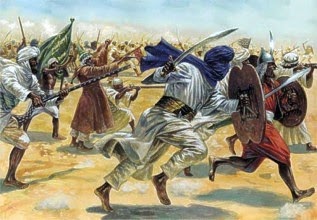Battle of Marj-ud-Deebaj : KHALID bin WALID behemoth Strategy
Battle of Marj-ud-Deebaj was fought between the Byzantine army, survivors from the conquest of Damascus, and the Rashidun Caliphate army in September 634. It was a successful raid after three days of armistice, on the Byzantine survivors of the conquest of Damascus.
BACKGROUND:
After the battle of Ajnadayn, the Arabs took easily all Palestine and most parts of Syria, including Damascus, after an one-month siege. The Byzantine commander Thomas, son-in-law of Emperor Heraclius, after hearing that Muslim troops had entered Damascus at the Eastern gate, wisely tricked the Muslim commanders at the other gates by suing for peace.After the trick was unveiled, the Muslim commanders advised Khalid ibn Walid that the peace agreement should be kept, because if the Greeks in Syria heard that the Muslims had given a guarantee of safety and then violated it, no other city would ever surrender easily to the Muslims, Khalid was not happy, but he agreed. So the Byzantine army and the Christians were allowed to leave the city together with their possessions with a deadline of 3 days to go as far as they can.
THE BATTLE BEGINS:
After the deadline was over, the Muslim cavalry caught up to them, using an unknown shortcut, on a plateau over the An-Nusayriyah Mountains in Syria, not far from Antioch and the Mediterranean sea. The refugees, due to a heavy rain had spread on the plateau, seeking shelter, while their goods lay all over the place. So many items of brocadewere scattered on the ground that the place became known as Marj-ud-Debaj (Meadow of Brocade). |
MUSLIM ARMY = RED
|
The elite Arab cavalry attacked the unsuspected Greeks from 4 directions. Khalid personally killed Thomas in a duel. After some severe fighting in the middle of all those brocades, the Byzantine resistance collapsed. Since the Muslims were too few to completely surround the Byzantine army and the fighting had become confused as it increased in violence, many Byzantines were able to escape. But all the booty and a large number of captives, male and female, fell to the Muslims. The daughter of Heraclius, and widow of Thomas, was also taken captive.
KHALID BIN WALID GIVING BACK THE DAUGHTER of Heraclius :
According to Muslim sources, Emperor Heraclius, sent an ambassador to Khalid asking his daughter back. She was liberated without ransom.
AFTERMATH:
The historian Waqidi writes that on their way back to Damascus, Emperor Heraclius sent an ambassador to ask Khalid to return his daughter. The ambassador gave Khalid the letter from the Emperor which read as follows:
| “ | 'I have come to know what you have done to my army. You have killed my son-in-law and captured my daughter. You have won and got away safely. I now ask you for my daughter. Either return her to me on payment of ransom or give her to me as a gift, for honour is a strong element in your character. | ” |
Khalid said to the ambassador:
| “ | Take her as a gift, there shall be no ransom. | ” |
The ambassador took the daughter of Heraclius, and returned to Antioch. The return of the Mobile Guard loaded with spoils was greeted with joy by the Muslims at Damascus. The whole operation from pursuit to the return of the Mobile guard had taken 10 days. They returned on October 1, 634. Upon his return Khalid was informed of the death of Caliph Abu Bakr and the succession of Umar as the new caliph. Umar deposed Khalid from his command and appointed Abu Ubaidah ibn al-Jarrah as the new commander in chief.
SOURCES:
http://www.byzantium.xronikon.com/battle.php
wikipedia.org
Akram, A.I. (1970). The Sword of Allah: Khalid bin al-Waleed, His Life and Campaigns




Comments
Post a Comment